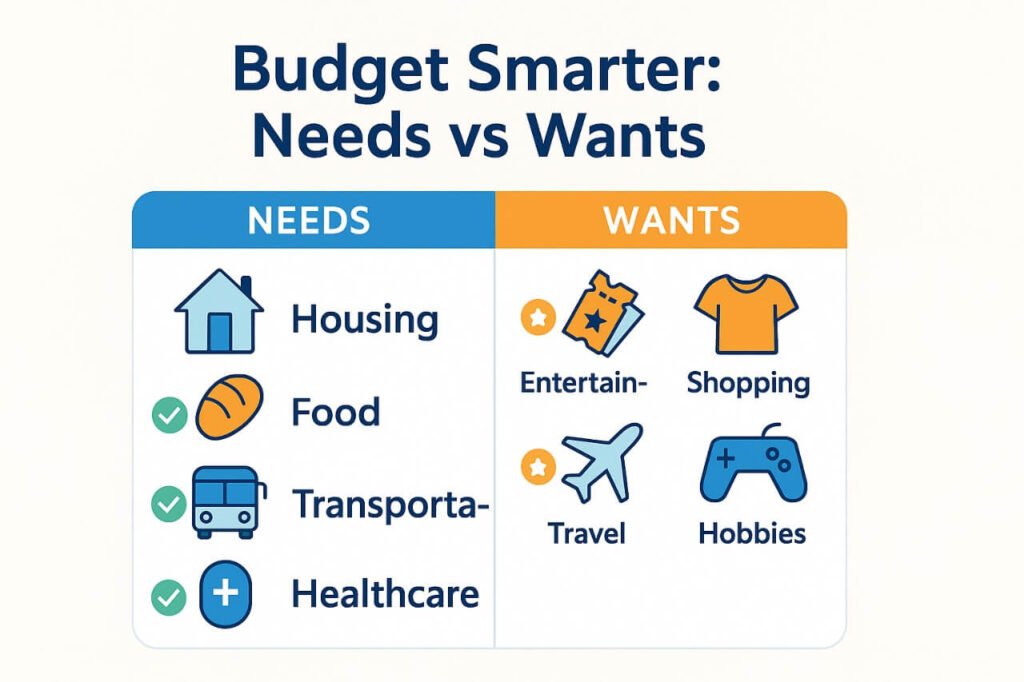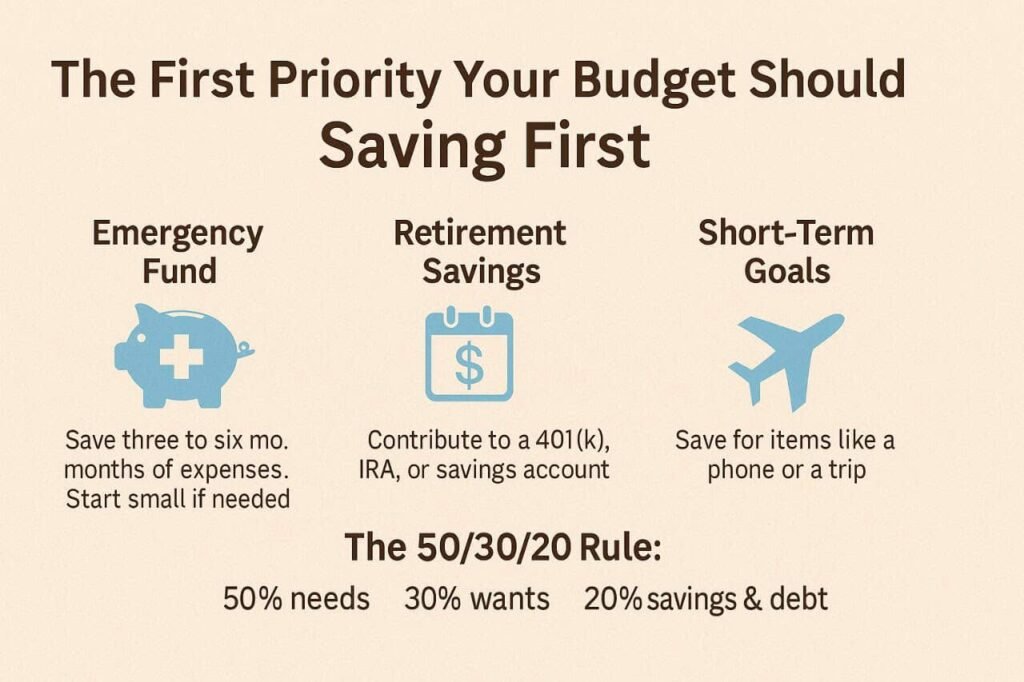The First Priority in Your Budget Should Be What
Table of Contents
50/30/20 Budget Splitter
See how much to spend on Needs, Wants, and Savings. Edit the percentages or pick a preset.
Income & Settings
Percentages (must total 100%)
Needs
Wants
Savings/Debt
Visualization
Tip: For **personal finance beginners**, a simple rule works best. Adjust percentages if you live in a high-cost city or have special goals.
The first priority in a budget should always be your essentials—housing, food, transportation, and healthcare. Once these basic needs are covered, the next priority is paying yourself first through savings. This balance ensures both stability today and security for the future.
For personal finance beginners, this is the most important money rule: before anything else, secure your needs. Once these essentials are handled, you can move on to savings, debt repayment, and other smart money management tips that strengthen your financial future.
The answer to this question will almost always be the basics that make your life function efficiently. So, when making a budget, the first thing that should come first is taking care of the necessities.
When I first started budgeting, I made the mistake of skipping groceries in my plan because I thought I’d “figure it out later.” Within two weeks, I was living off instant noodles and borrowing lunch money from a friend. That was a wake-up call. Essentials like food and transport aren’t optional. They should always be the first line in your budget, no matter what.
Why The First Priority in Your Budget Should Be Your Essentials
Things like rent, groceries, and transportation are not optional—they are the foundation of your budget priorities. Think of them as “needs” in the classic needs vs. wants approach to money. Covering these first creates a stable base for everything else, making it easier to manage other personal finance goals later.
Honest Suggestion: Before you buy any subscription or new clothes, ask yourself, “Have I covered rent and groceries this month?” If the answer is no, pause that purchase. Essentials always win.
But here’s the catch: especially when most people tend to overlook this step. Almost everyone jumps into fun spending or forgets to plan for savings, thinking everything will work itself out in the long run.
According to the Consumer Financial Protection Bureau, the very first budget priority should always be your essential needs—housing, food, transportation, and healthcare—because these create the base for financial stability (CFPB, Budgeting Basics).
Whether you call it prioritizing, budgeting smart, or even building a money-first mindset, always know the first spending choice you make supports your well-being.

What Counts as Essentials: Housing, Food, and More
Needs Before Wants—Why Essentials Come First
In budgeting, needs vs wants is the golden rule. Essentials always come first because they are the non-negotiables of life—housing, food, healthcare, utilities, and transport.
By clearly defining your needs, you avoid overspending on wants and can set realistic budget priorities. This balance not only prevents financial stress but also strengthens long-term financial stability.
- Housing: This includes the rent, mortgage, property taxes, and repair costs for your household.
- Utilities: water, gas, electricity, telecommunication networks, and Wi-Fi—the essentials for modern living.
- Groceries/sustenance: Basic food items are crucial to keep you fed and in shape.
- Transportation: Some ways to get around are driving, taking the bus, and getting to and from work.
- Healthcare: regular check-ups, medications, and health insurance are vital to be taken care of. The health of a person should always come first.
- Insurance: one of the most important types of insurance for individuals and households.
Don’t forget to track your spending. Only after these essentials have been addressed can your needs and additional saving desires be considered

The First Priority in Your Budget Should Be Paying Yourself
2. Build Savings Before You Spend Extra
After covering your essential needs, the next budget priority is “paying yourself first.” For personal finance beginners, this is one of the smartest money management tips you can follow: save before you spend. Even if it’s a small amount, consistent saving builds resilience and sets you on the path toward financial security.
The first time I got a part-time job, I spent almost my whole paycheck on clothes and video games. When my laptop charger broke the next week, I had zero saved to replace it and had to wait until my next payday. That moment taught me why paying yourself first—even if it’s just $20 into savings—can save you a lot of stress later.
Saving should come before extra spending. Setting aside money first helps build a stronger financial future. Before buying non-essentials like clothes or subscriptions, make sure your savings goals are on track.
Some ways to save the most money:
- Set Up An Emergency Fund: This is one of the best practices to focus on next. Ideally, trying to save up to cover three to six months of basic living expenses is the best approach. If that’s a stretch, even setting aside small amounts, like ten pounds a week, can help. This fund helps make dealing with the unexpected easier. It helps you breathe easier when life tries to throw a curveball at you.
- Start Saving for Retirement: This might sound to many as outlandish and even too early to think about, but the more you save, the greater returns you can get from compound interest. So, whether you go with a pension scheme, an individual savings account, or even a simple savings account, any amount towards retirement helps in wealth accumulation.
- Short-Term Goals: Savings can be set aside for all sorts of reasons, such as buying the new phone, travelling, or picking up a new hobby. Rather than dipping into your essentials, budget for those goals. It is much easier and a lot more enjoyable to spend money that is set aside.
- Use the 50/30/20 rule:The 50/30/20 rule splits your money like this: 50% for needs, 30% for wants, and 20% for saving or paying debt. It’s an easy way to balance spending and saving. For example, if you earn $1,000 a month, $500 goes to essentials like rent and food, $300 to things you want like movies or games, and $200 to savings or debt.
Financial experts highlight the 50/30/20 rule—50% needs, 30% wants, 20% savings or debt—as one of the simplest ways to structure money. NerdWallet explains this as a proven formula to keep spending balanced while building savings (NerdWallet, 50/30/20 Rule Guide).

The First Priority in Your Budget Should Be Flexiblity
How Life Changes Affect Your Budget
Sticking to a strict budget is certainly easier when set at the beginning. But the truth is, we all have to face the music eventually, and Life often brings unexpected changes, such as starting school, beginning a new job, building a career, or launching a business. Adapting to change is most important to the flow of everyday life.
When my class schedule changed, I suddenly had to pay for extra bus rides I hadn’t budgeted for. At first it threw my whole plan off. But once I adjusted my budget and cut back on non-essentials, I realized flexibility is just as important as discipline. A budget isn’t about locking yourself in—it’s about adapting without losing control.
With this guide, you’ll be able to keep pace.
Tips for Adjusting Your Budget When Income or Expenses Change
- Adjusting your income: No matter how much you begin to earn or if your hours get cut, always make the necessary shifts to your budget. The moment your income changes, freshen things up!
- Unanticipated Expenses: Medical bills, car troubles, or a last-minute flight; life is bound to throw things at you—sometimes things that aren’t particularly convenient. In situations like these, having a secondary plan and backup funds to provide you with a buffer will help you ease the tension.
- Transitional Phases of Life: Measurable milestones like advancing to secondary school, marrying your partner, or bringing life into the world change the expenses set in your life. With changes in life, new goals and responsibilities also arise.
- A complete budget review to keep track of your spending every month is a healthy and smart habit to adopt. With a streamlined set of goals awaiting at the end of the month, you’ll be able to efficiently keep track of your spending, and with a clear budget in place, you’ll gain control over your finances and make steady progress toward your goals.
- Adhering to a budget may be daunting for a lot of people, but the minute one understands how simple the concept of flexibility is, it is transformed from a set of figures into a powerful, life-enhancing blueprint.
Final Take: The First Priority in Your Budget Should Be Stability
Let’s simplify things: The first priority in your budget should be meeting your basic needs—because without them, there’s no stability. From there, savings and flexibility ensure long-term financial stability. For anyone learning personal finance for beginners, remember this: prioritize needs, save early, and adapt to change. These are timeless money management tips that will keep your finances strong, no matter what life brings.
That means:
- Covering your needs
- Saving before spending
- Adjusting when life changes
Touheed’s Tip: Think of your budget like a phone battery. Essentials are the charger. Savings are your backup power bank. Flexibility is turning off extra apps when your battery runs low. Together, they keep you running strong.
But don’t only think about budgeting as a mathematical problem—shift your mindset. When your focus is on your immediate needs and securing peaceful living for the long term, spending becomes purposeful.
Making keeping your budget the main focus enables calmness in emergencies and confidence in growth phases. When the focus is on long-term needs, not just immediate pleasures, success is almost certain. After these steps, everything else will be a lot smoother. Budgeting will shift from a chore to a form of freedom.
Your budget should be balanced and prioritized as required; spending will enable purposeful budgeting as well.
Ready to take control of your finances? Explore these practical budgeting guides tailored for students:
In the End
Budgeting starts with knowing your priorities: covering essentials, saving early, and staying flexible. When you focus on these basics, managing your money becomes simpler and less stressful.
Now it’s your turn—take what you’ve learned here and start shaping a budget that works for you. And if you want more tips and tools to keep your finances on track, check out our latest blog post for fresh ideas to boost your money skills.
Budget Priorities Answered
1. Why do I always run out of money even if I set budget priorities?
Many people set priorities but don’t track small expenses like snacks, subscriptions, or impulse buys. These “leaks” drain money. A simple fix is daily expense logging (even just notes app entries) to catch patterns.
2. Should debt payments come before essentials in my budget?
Essentials (food, housing, healthcare) must always come first—otherwise survival is at risk. But minimum debt payments should be your second priority to avoid penalties. Overpayments/debt snowball comes after essentials and savings.
3. How do I set budget priorities when my income changes every month?
For freelancers, gig workers, or students, income fluctuation is stressful. The trick: base your budget on your lowest predictable income, then treat extra income as “bonus buckets” (savings, debt, or wants).
4. What if my essentials already take more than 50% of my income?
This is a hidden pain point many ignore. If rent + utilities + transport eat up most of your paycheck, focus on:
- Downsizing housing or sharing rent.
- Cutting fixed bills (switching internet/phone plans).
- Boosting side income.
You can’t balance priorities until essentials fit your budget.
5. How do I prioritize saving when emergencies keep draining my money?
Most people fail here—they save, then wipe it out for emergencies. Solution: split your savings into two accounts:
- Emergency Fund (short-term shocks).
- Future Fund (long-term goals).
This way, you don’t sabotage your long-term stability.
6. Is flexibility a budget priority or just an add-on?
Flexibility is underrated. Without it, one unexpected bill destroys your plan. Treat flexibility like an invisible expense line—always leave 5–10% unallocated for surprises.
7. How do budget priorities change if I live with parents or share expenses?
If essentials (housing, food) are partly covered by parents or roommates, your first priority shifts: savings, debt payoff, or skill investment should lead. This is an untapped advantage most people ignore.
Fresh money guides you’ll love
Slash months off your auto loan with smart payment hacks.
Read nowYes, it’s possible: rent and still build your home fund.
Read nowStart early, save smart, and unlock your first place.
Read nowTurn the dream trip into a reality with fun saving tricks.
Read now

1 thought on “The First Priority in Budget Should Be Essentials (and How to Pay Yourself First)”